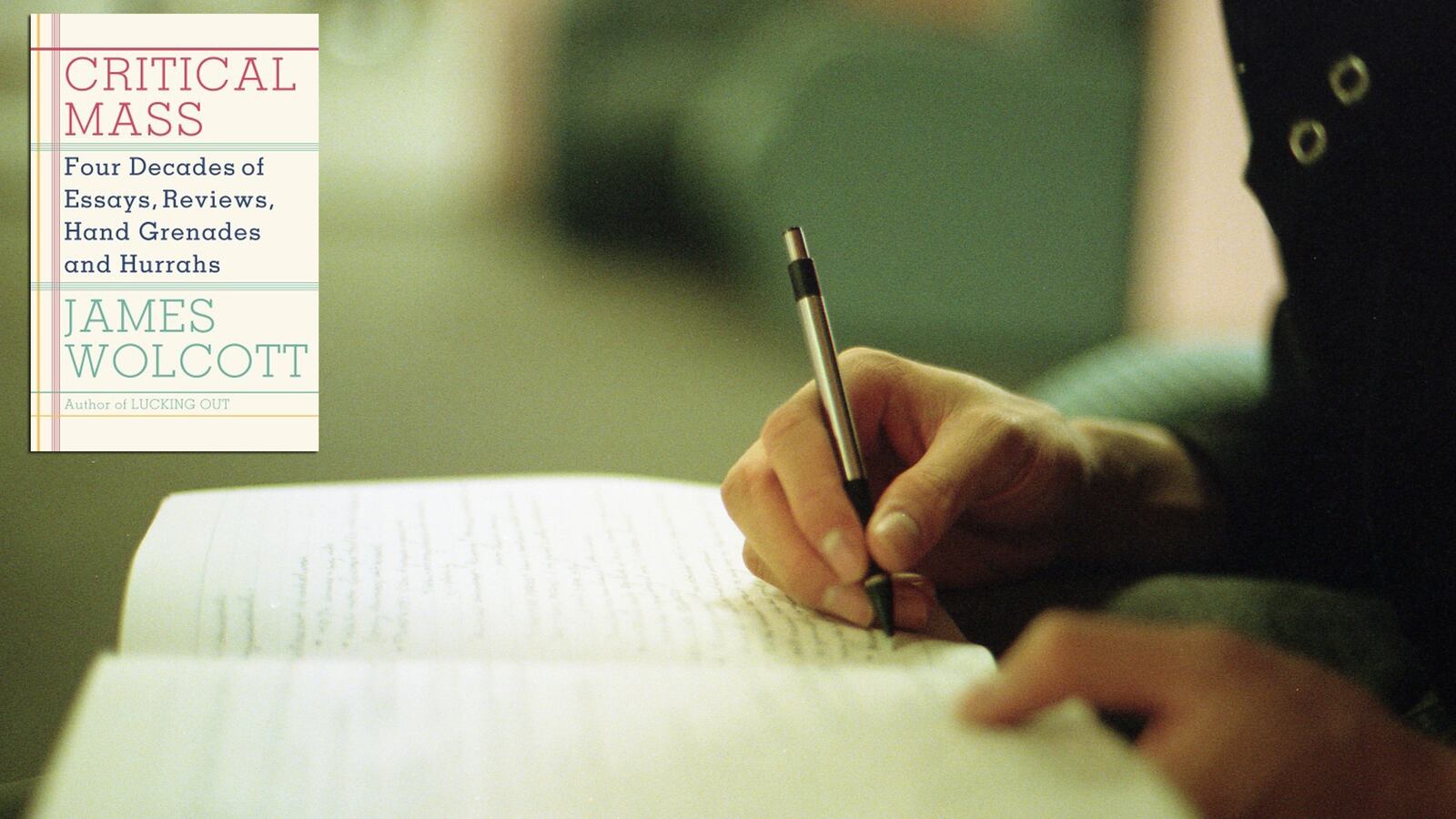In a 1932 letter to a friend, George Orwell complained that the book sections of newspapers “seem deliberately to seek out the dullest people they can get to review the dullest books.” Amis the Younger, writing about John Updike in 1976, had this to say about literary comment: “The crucial defect is really no different from that of any other kind of writing: it is dullness. The literary pages throng with people about whom one has no real feelings either way—except that one can’t be bothered to read them.” Both Orwell and Amis were no doubt taking a page from Oscar Wilde, who believed, in typically Wildean fashion, that dullness was the only unpardonable sin. Paul Fussell, in his sapient and comical essay “Being Reviewed,” promoted the blasphemy that the critic “has an obligation to be interesting, which means, variously, funny, dramatic, significant, outraged, or winning. The reviewer is writing an essay, and the book in question is only one element of his material.”

One can’t help but notice that much of the books coverage in this land is not only irrepressibly dull but also hopelessly middlebrow. It often reads like water-cooler conversation or, worse, like a Larry King interview. Pick up any national newspaper or scroll to any cultural website and, if the book section hasn’t been already extirpated, you are sure to find literary comment authored by dozy reviewers with delusions of adequacy. The fiction reviewers, especially, are happy to pad their bland plot summaries with writing-workshop opinions such as “the narrator feels contrived” or “the story feels predictable” or “I don’t feel the characters are likable,” as if those were valid critical assertions. They are not. What a critic feels has no traction at all—what matters is what the critic thinks in relation to what the writer intends.
For the past forty years critic James Wolcott has been a cerebral antidote to the dullness contaminating our cultural pages. Vanity Fair columnist and author of the recent memoir Lucking Out—about the alarums and excursions of New York City in the 1970s—Wolcott is perhaps best known as the checkmater of enshrined reputations. He’s not above guying self-consciously important writers if the opportunity arises. And as everyone knows, the opportunity is always arising. Add to this the fact that self-consciously important writers don’t respond well to guying and Wolcott makes for one obese bête noire. An unswerving devotee of Norman Mailer and Pauline Kael, Wolcott can’t get out of bed in the morning without thanking the Great American Male Persona and the Great American Movie Critic, both of whom were his mentor-facilitators who taught him all about the punch of intellectual integrity.
His newest book, Critical Mass: Four Decades of Essays, Reviews, Hand Grenades, and Hurrahs, collects some of his most winning assassinations. “Stop Me Before I Write Again” will find a fan in anyone who’s ever suspected that something is seriously wrong with Joyce Carol Oates. “Guns and Poses” smacks around the “platitudinous” pistolero Richard Ford, whom Wolcott quotes retching these lines in an interview: “I don’t walk. I hunt. Something dies when I stroll around outside.” If you’ve ever had any doubt that Anaïs Nin was a vacuous minx unstoppably in love with herself, “Life Among the Ninnies” will vanquish that doubt. One does, however, experience a kind of jolt to see Wolcott’s intellect bamboozled by that cultist Ayn Rand. Her two most famous tomes are to literature what Waco was to reasoning—they’d make fine wheel chocks but they don’t come close to serious fiction.
A college dropout, Wolcott began his scribbling career at The Village Voice in the mid-1970s—Mailer provided him a letter of introduction after Wolcott mailed him an essay in praise of Mailerian swagger—and immediately set himself to diagnosing the culture. Patti Smith, Lou Reed, Johnny Rotten, Johnny Carson, Richard Hell, Vanessa Redgrave, John Cale, the Ramones, even a tweedy seminar sponsored by the journal Salmagundi and starring no less than Susan Sontag, Dwight MacDonald, and Cynthia Ozick: Wolcott shook his pen like a thermometer to let us know how hot or cold we were running.
The opening essay in Critical Mass—the college essay that led to Mailer’s buttressing of Wolcott—is a celebration of Mailer and Gore Vidal’s infamous spat on the Dick Cavett Show in 1971. A sadness can descend upon you reading this account of immortal minds in combat on national television, because what passes for literary fracas today? Jonathan Franzen, doyen of the bookish elite, stooping recently in The Guardian to insult the self-promotional parades of Jennifer Weiner, that matriarch of the middle-class homemaker who doesn’t have an Eve’s chance in Eden of being remembered in thirty years, never mind in three-hundred. If you have a high tolerance for logical transgression, for solecism and non sequitur, you can read her retort to Franzen at The New Republic. In the Dick Cavett Show brawl—Wolcott’s essay is titled “O.K. Corral Revisited”—Mailer does come off looking like an uncommon buffoon while Vidal sits beautiful and cool, but at least their minds and egos were matched, and at least they were tussling over an issue that matters: literary dignity.
The most rabid misconception about Wolcott is that he’s a fulltime pugilist incapable of applause. Any critic with the vim to plunder also has the vim to praise—see Vidal on the divine Dawn Powell—and some of Wolcott’s best essays are appreciations of those artists who have satisfied his tough standards: Hitchcock, Michael Mann, Sam Peckinpah, Brian De Palma, Kingsley Amis, and Philip Larkin, among them. He’s a giddy apostle for what he loves—not every critic is—and he proselytizes with a stylistic vigor rare among us. His kindest reviewers are typically gaga for the snap of his sentences, and when he’s good—when he fends off the purple messes that tempt him—few living critics are better. The comic Andy Kindler performs like “a Pez dispenser of passive aggression.” Al Pacino is “chimp-faced and uncouth” in De Palma’s film Scarface, “a Brechtian epic of power mania run amok” in which “dead bodies litter the screen in layers, like lasagna.” Martin Amis’s memoir Experience is “part hair shirt, part memorial quilt… He tailors his tone to his crucifix.” David Letterman is “the ninja of neurosis.”
David Remnick once gently chided Wolcott for being all dazzle with no depth, and although it’s true that his essays don’t normally contain the deep societal immersion of a Matthew Arnold, or the urgent moral program of a Christopher Hitchens, or the wide-net political imperative of a Gore Vidal, it’s not true that Wolcott lacks depth. Wanting art well made and beautiful might still be called aestheticism, but it is also a virtue in itself that needs no ism, no labeled platform to stand upon. We can’t hold Wolcott to the same standards as an Elizabeth Hardwick or Lionel Trilling or Alfred Kazin: he isn’t that kind of critic and he’s never tried to be. Nor has he ever tried to compete with the outsized celebrity and effortless charisma of Hitchens, his Vanity Fair colleague until the latter’s death in 2011. Despite Wolcott’s longstanding, lofty perch at Vanity Fair, there’s always been a strain of nationless renegade in him, informal and pop, the fugitive brat sans academy, more Hunter Thompson than Irving Howe.
There’s also tremendous value in sharp-eyed seeing alone, in doing what critics have been doing from Aristotle to Walter Pater to Mary McCarthy to John Updike: enhancing, augmenting art and culture by helping to explain the complexity and dynamism in their DNA. Some of Wolcott’s analysis forever tweaks how you see, hear, and read. About Letterman and Leno:
On any given night the difference between Letterman and Leno isn’t one of talent and material but one of temperament. Leno is a man of no discernible psychology. He doesn’t seem given to high or low moods. He’s a Las Vegas vending machine of predictable jokes. Letterman is less containable.
About Woody Allen:
His comedies form one of the main bridges between modernism and postmodernism, linking the bookish neurosis and absurdism of the bohemian 50s and 60s (Freud, Jules Feiffer, Mort Sahl, Nichols and May) to the flippant, noncommittal, nonintrospective, free-floating irony of the yuppie ascendency (in a word, Seinfeld).
And here are the truest lines he’s ever written: “Wisdom is for statues. Humor uncaps our inhibitions, unleashes our energies, seals friendships, patches hurts. Laughing is probably the most alive you can be.”
Wolcott’s real weakness is identical to the crime for which he guillotines Joyce Carol Oats: sloppiness. He hasn’t been inoculated against cliché and so every few pages in Critical Mass you will find unwell language sneezing at you: “inner circle,” “deadpan humor,” “stiff competition,” “ticking time bomb,” “rock solid,” “straight and narrow,” “sky high,” “screeching halt,” “sopping wet,” etc. More than once he treats us to the automatic jargon of “diametrically opposed” without the least interest in hearing the plangent redundancy: “diametric” means “opposite.” Redundancy in general remains an issue for Wolcott: “white-boned,” “pale-moon,” “bulk-sized,” “streaming cataract,” “forlorn rue.” So too does the cacophony of his rhymes: “running afoul of verbal scowl,” “haughty bitches and breathy ditzes,” “Swiss-roll motorcycle moll,” “lumpy, dumpy, grumpy.” About Mailer’s alleged misogyny later in his life: “some of the old bumps in the night have come back to bite.” Bumps that can bite: that’s one mongrelized metaphor. These pimples protrude all the more because the rest of the face is reliably handsome—in his long essay on Martin Amis, “The Amis Papers,” there’s only a single clangorous train of words: “flying tomahawk of a fuck-off letter.”
In his introduction Wolcott admits to “going soft” lately, to “becoming a more loving, caring, dulcimer-strumming individual.” That’s a rather limp peacenik impression, an insincere pandering to the bloody-hearted masses who would cut the throat of literary integrity rather than risk hurt feelings. Wolcott wants to judge less stringently because “a writer’s morale and position are much more precarious in the digital age when words have never been so promiscuously flung and cheaply held.” But he has that formulation precisely backward. At a time when anyone can be an instant writer and everyone seems to be, in this era of immediate publication on Amazon, compulsive blogging, and rampant MFAs, the critic cannot go soft. It’s daily getting more difficult for the notes to rise through the noise, and so critics must retake their traditional place as the arbiters of culture. They must judge wisely and they must judge roundly—they must judge the alps of junk straight out of existence.
The great poet-critic Howard Nemerov, in the preface to his 1963 collection of essays called Poetry and Fiction, wrote this: “A failure to judge, as the example of Cordelia seems to show, has the effect of leaving judgment to the mercies of fools and knaves… And because art is too beautiful to be thus abandoned, the critic, stodgiest of martyrs, sins and is damned, over and over again.” Critical Mass is less massive than it could have been. Many of Wolcott’s greatest hits are not included here, which gives one hope that more essays are collecting in the pipeline. Moreover, Wolcott is probably too dignified to believe his own softy babel, which means his admirers can cross their fingers for his continued sinning and self-damning in the worthy name of art.






